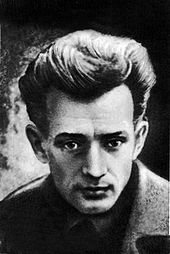Yevhen Pluschnyk
Yevhen Pawlowytsch Pluschnyk ( Ukrainian Євген Павлович Плужник ; scientific transliteration: Jevhen Pavlovyč Plužnyk; * December 14th July / December 26th, 1898 greg. In Kantemirowka , Voronezh Governorate , Russia ; † February 2, 1936, Solovets Islands ) was a February 2, 1936 Ukrainian poet.
Life
Yevhen Pluschnyk was born as the youngest of six children in a Ukrainian family in Kantemirowka, a city in the Voronezh governorate that was formerly part of Sloboda-Ukraine . The father Pavel, who comes from a farming family in the Poltava governorate , moved to Voronezh because of the scarcity of land , where he hired as a handyman in a textile trading company in order to finally work his way up to a managerial level. The mother suffered from tuberculosis , Jewhen and his siblings also contracted the disease at an early age.
Pluschnyk attended grammar schools in Voronezh, Kantemirovka, Rostov and Bobrov . A highly headstrong student interested only in history and literature, and a notorious truancy, he had to change schools every few years. After the father lost his job due to the October Revolution , the family moved back to the Poltava region in 1918. During the civil war , Pluschnyk taught literature and language in several villages.
In 1921 Pluschnyk moved to Kiev to live with his sister, who enrolled him at the Institute of Veterinary Medicine and Zoo Technology, of which her husband was the rector. After a short time, however, he switched to the Institute for Music and Drama to become an actor, but also had to drop out of school due to his tuberculosis disease.
At the institute Pluschnyk met Halyna Kowalenko and they married in 1923. At the insistence of his wife, Pluschnyk read his first poems at a meeting of the Kiev literary group ASPYS in 1923 and quickly established himself as one of the most important voices in Ukrainian poetry. In 1924 he joined the literary group Lanka (chain link), in which seven young literary talents from Kiev came together around Valerjan Pidmohylnyj . In 1926 they renamed themselves MARS (Majsternja revolucijnoho slova; workshop of the revolutionary word) and claimed to bring together the revolutionary writers and critics of Kiev. The organization fell apart in 1928.
In the summer of 1926, Pluschnyk's health deteriorated. Nevertheless, in the same year he published his first volume of poetry, Dny (Days), and Rannja Osin (Early Autumn) appeared just a year later . He also translated Russian prose into Ukrainian, including Chekhov , Gorky , Tolstoy and Scholokhov . His first and only novel Neduha achieved some success with readers, but it was received coldly by the critics. In 1929 he published two plays that were never performed. He hoped to achieve his breakthrough as a playwright with the verse drama Smowa w Kyjewi , on which he worked for several years. When the play was finished in 1933, he succeeded in convincing Les Kurbas of its qualities, who wanted to bring it to the stage in his Berezil theater. However, Smowa w Kyjewi was never performed, and his third volume of poetry, Riwnowaha (Equilibrium), also completed in 1933, could no longer appear.
On the night of December 4th to 5th, 1934, Pluschnyk was arrested by the NKVD and sentenced to death by shooting on March 28th, 1935. However, the death penalty was commuted to 10 years in prison in the Solovetsky Islands . But the labor camp in the inhospitable north also promised certain death to Pluschnyk, who was suffering from tuberculosis. He died the following winter, on February 2, 1936.
Works
poetry
- Дні, 1926
- Рання осінь, 1927
- Рівновага, 1933 (first published in 1948 in Augsburg, in Ukraine only 1966)
Dramas
- Професор Сухораб, 1929
- У дворі на передмісті, 1929
- Змова в Києві
novel
- Недуга, 1928
Web links
swell
- Čerevatenko, Leonid. "Vse, čym duša bolila." in Jevhen Plužnyk. Poeziji. Kyjiv 1988.
| personal data | |
|---|---|
| SURNAME | Pluschnyk, Yevhen |
| ALTERNATIVE NAMES | Pluschnyk, Yevhen Pavlovych (full name); Плужник, Євген Павлович (Ukrainian) |
| BRIEF DESCRIPTION | Ukrainian writer |
| DATE OF BIRTH | December 26, 1898 |
| PLACE OF BIRTH | Kantemirovka , Voronezh Governorate , Russia |
| DATE OF DEATH | February 2, 1936 |
| Place of death | Solovetsky Islands |
